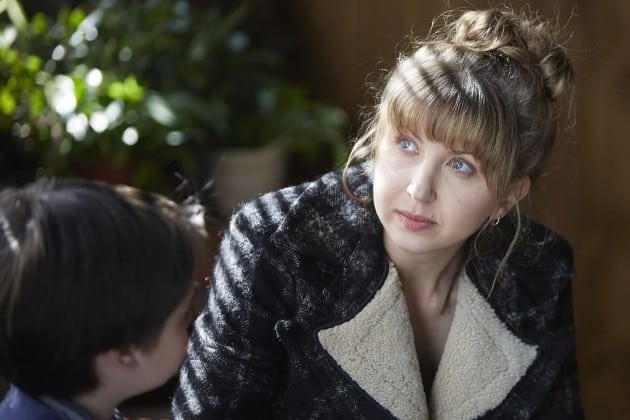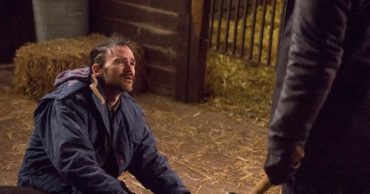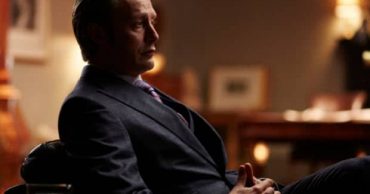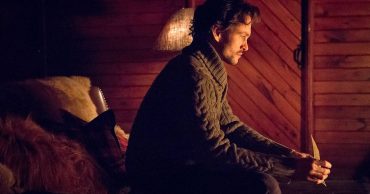
It is with some amount of trepidation that we begin to think of our own answers to Hannibal Lecter’s question at the end of “…And the Beast from the Sea”: “Don’t you crave change?” In context, Hannibal is passing off Francis Dolarhyde’s inner struggle with the Red Dragon onto Will. But change is pervasive both within Hannibal and outside of it. It seems too obvious to simply say that change is inevitable–that the nature of life revolves around change–so the focus on the process of change might be better looked at in terms of how it affects us, and one entry into that may be to consider how we deal with change at different stages in life. Though change often occurs less frequently as we get older because of the power and comfort of routine, it becomes more emotionally taxing to deal with. Even talking to people only ten years removed from high school, many will lament the slow, persistent change of social life–ever diminishing, ever more unsatisfying. Hannibal, too, has become older along with its characters. Alana Bloom is far removed from the nurturing optimist of season one, just as Jack Crawford’s stubborn professionalism has moved him further and further from sympathy (the death of Bella has also played a large role here). The ways these and nearly all other characters have changed contribute to how plots unfold, which is to look at the effects of change on their most basic level. Yet, our relationships with the characters also must undergo change, and so our perceptions of them must also shift.
That fact makes characters like Alana and Jack tricky subjects, since we instinctively think of them as protagonists who deserve our support. But what heroic qualities do these characters possess in the aftermath of all the horror they have experienced? Time has changed them, but is it for the better? Do we crave this version of Alan after heavy viewership backlash calling for something other than tokenistic romantic interest (for my part, I never agreed with any of that, but I’ve also never considered Alana one of the central characters in any of the three seasons)? The Alana Bloom we see taunting Hannibal Lecter is one who has not learned the lesson that Bedelia has (recall her conversation with Will about going to see Hannibal in last week’s episode). Because of Hannibal’s inhuman power over other people and his knack for self-preservation, Alana pushing Hannibal into indignity is a controlled act of insanity. Similarly, Jack Crawford coming out and saying, in other words, “I want this person to kill himself” partially fits with his established character, but it also takes it to its extreme. So, too, does his own lack of displaying empathy (though not necessarily an actual lack of empathy) regarding Will, Molly and Walter. I, at least, see change in these characters that makes me think of them less as heroes and more as murkily-defined, fitting nicely alongside many of the serial killers and other antagonists in the series whose motivations are marred by insufficiently “good” actions. That is not to say that Alana or Jack has shifted completely into that territory, but it is intended to suggest that “hero” and “villain” are terms that Hannibal has an interest in muddying. And, to refer back to how change affects us, it is also not meant to make a claim about how effective this version of each character is compared to previous versions; these are merely different, changed versions who deserve re-consideration.
The focus of Hannibal’s discussion with Will about change, though, is Dolarhyde, and–again–Dolarhyde is being used as a parallel to Will. Both characters possess a duality about them, and they can’t seem to function very well under those circumstances. It’s the reason why each character cuts ties with the person he is closest to (Will to Hannibal earlier this season, Francis to Reba in this episode). Until the character can shed the skin and split that personality, he is not safe in his own skin, let alone around anyone else. Will’s change did come from a craving to be rid of Hannibal, and–to my mind–has made him even more sympathetic than he originally was. No longer defined by the fault in his empathy, picking up strays and claiming responsibility where it is not his to claim, Will’s relationship with Molly has fostered that desired change best. With her, Will is more comfortable and willing to be the vulnerable self he was trying to be with Hannibal. Dolarhyde tries to achieve this with Reba, but Dolarhyde is much more alone in these episodes than Will has been throughout the series. Even though Hannibal’s influence has sometimes been destructive for Will, it provides him with unyielding companionship and a sense of belonging, whereas Dolarhyde receives only punishment and scolding from the Dragon. So, as much as Dolarhyde would want to follow in Will’s footsteps and as much as he craves change, his road to change is significantly more challenging.
That is made true because of Hannibal Lecter, who seems like the character who has changed the least over the course of these seasons. This is likely because he is less of a malleable character or human being and more of a conduit for other people’s change, molding them into what he deems is best for them. When asked by Alana if he would have told her the truth about his contact with Dolarhyde, he responds: “In my own way, I always have.” It’s a statement that rings strikingly true, and it’s one that highlights how unchanging Hannibal has been in his ways. The result of that trajectory is that, unlike many of the other characters who deserve to be re-examined in terms of motivations and actions, Hannibal has been an anchor for the audience. Rarely has there ever been a moment that hasn’t felt like “Wow, Hannibal is awful…but I kind of like him” for anyone who has been able to open up to his particular brand of character; and for the others, the complete villainy will have also remained unchanged. It makes sense, then, that he acts as the conduit once more, asking Will about his desire to change and speaking about change from the detached perspective of someone who is beyond it. This is something worth considering with the final episodes of Hannibal fast-approaching, since it appears to be important to how we react to the events in these episodes. As characters change, are they aware of how and why they are changing? And, if so, do those changes help us to understand the characters they are becoming?
Bite-Sized Thoughts: Buon appetito!
– “Jack Crawford, fisher of men.” There’s definitely a lot more animosity between Will and Jack, which fits with the high school comparison. They are like old friends who have realized that they’re really nothing alike and that there probably isn’t much use in continuing any sort of friendship just for the sake of it.
– “You can always toss the Dragon to someone else.” Yeah. Right.
– “Save yourself. Kill them all.” I continue to thoroughly enjoy the way that directors are playing with perspective this season, visualizing a different reality before shifting into what’s actually happening. Any excuse to be back in Hannibal’s office, right?
– Walter calls Will “Dad” in this episode when he’s speaking to Molly. Identification and possession are really interesting (Molly: “My son almost died,” my emphasis).
– Personal ads? Notes of admiration on toilet paper? Hah! How ridiculous!
– So, just as last week’s episode was completely and utterly elevated by the tiger scene, this week gets a significant boost from the home invasion, which is a tense, horror masterpiece. It’s as breathtaking as the tiger scene, but in a much different way, Armitage’s movements being disturbing and terrifying. The scene also highlights how sharp Molly is, making it feel like she’s been in all of these episodes rather than just the few.
– The break-up with Reba is actually pretty rough, because a lot of investment has been earned in such a short time. I think we should really be liking these characters together, and whenever unfortunate circumstances get in the way of it, it’s just hard to watch. The dramatic irony is powerful, of course, but even without it, Reba’s perspective is heartbreaking.
– I have no idea what instrument or item is being used for the scoring, but in the transition between Dolarhyde in Hannibal’s office to the CSI crew there, there is a groaning or wailing that really brings out the pain of the Dragon’s failure.
Hannibal by the Numbers:
Speaking roles:
- Will, 66 lines
- Hannibal, 62 lines
- Dolarhyde, 49 lines
- Molly, 41 lines
- Reba, 26 lines
- Alana, 20 lines
- Walter, 16 lines
- Jack, 15 lines
- Veterinarian, 9 lines
- Brian, 1 line
- Driver, 1 line
Total: 306 lines
19 total scenes
Shortest scene by line count: 2-way tie, 0 lines
Shortest scene by running time: Dolarhyde eating painting, 0 min. 10 sec.
Longest scene by line count: Will visits Molly in hospital, 35 lines
Longest scene by running time: home invasion, 4 min. 56 sec.
Extraneous observation: this is only the second episode of the season in which Will and Hannibal are the two most prominent characters based on line count.
[Photo via NBC]
 Follow Us
Follow Us




